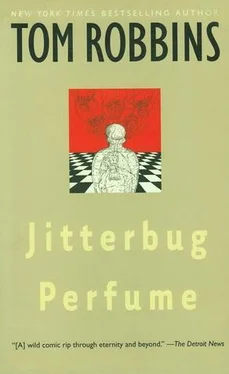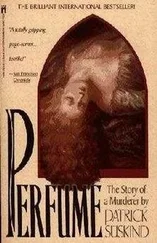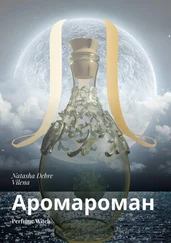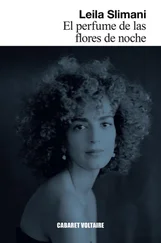“Fragrance is a conduit for our earliest memories, on the one hand; on the other, it may accompany us as we enter the next life. In between, it creates mood, stimulates fantasy, shapes thought, and modifies behavior. It is our strongest link to the past, our closest fellow traveler to the future. Prehistory, history, and the afterworld, all are its domain. Fragrance may well be the signature of eternity.”
“That's laying it on a bit thick,” commented Claude. Luc made an effort to nod in agreement, but his head was so full of hot, noisy, polluted blood that it felt like a bistro on a weekend midnight, and he could not move it.
The tape was enjoying perfect health, however. It stuck steadfastly to its pace. “There is a long-standing argument about whether perfuming is a science or an art. The argument is irrelevant, for at the higher levels, science and art are the same. There is a point where high science transcends the technologic and enters the poetic, there is a point where high art transcends technique and enters the poetic.
“A perfumer, of course, is neither a quantum physicist nor a painter, but at his best, when his purposes are high purposes, when his imagination is liberated, his choices inspired, he, too, enters the poetic. And it is revealed to him, then, what the ancients meant when they said with conviction that the soul receives its sustenance via the sense of smell.
“I have spoken to you this afternoon of poetry and of sexual magic. Not too many years ago, the names of our perfumes bore testimony to such things. There was a popular scent called Tabu , there was Sorcery, My Sin, Vampire, Voodoo, Evening in Paris, Jungle Gardenia, Bandit, Shocking, Intimate, Love Potion , and L'Heure Bleue —The Blue Hour. Nowadays what do we find? Vanderbilt, Miss Dior, Lauren , and Armani , perfumes named after glorified tailors" — there were murmurs and gasps in the audience—"names that evoke not the poetic, the erotic, the magic, but economic status, social snobbery, and the egomania of designers. Perfumes that confuse the essence of creation with the essence of money. How much sustenance can the soul receive from a scent entitled Bill Blass ?
“ Vanderbilt and Bill Blass are what the 'marketing people' have given us.”
Marcel paused, as if trying to contain a coiling rage. Claude slapped the creased thigh of his expensive gray trousers. “Give them hell, Bunny,” he said, with a mixture of affection and mockery. Luc, meanwhile, had laid down his cigar so that he might employ both his hands to massage his exploding temples.
“ Vanderbilt and Bill Blass , alas. But you know, you perfumers, in the deep unfolding rose of your hearts, you know that fragrance is no automobile or table setting, no insurance policy, no Preparation H. Attempts to reduce perfume to a predictable product with which cost accountants can safely deal; attempts to own it, control it, and make it happen when the mysterious spirit is not there are fated to end in crude failure and coarse farce.
“Perfuming is most unlike manufacture. And perfumers should be proud to assume our historic roles as enchanters, soul feeders, sacred pimps, and alchemists. 'Marketing people' are fine enough when it comes to peddling wares, but let us remember always that it is the perfumer, the flowermaster, the guardian of the Blue Hour, who can charm the birds and bees in the human spirit — and destroy its dinosaurs.”
Scattered applause. Shocked murmurs. Nervous laughter. Then, the white-on-white whirr of blank tape.
“That's that,” said Claude, relieved that it hadn't been worse than the first time that he heard it. “The wonderful Wizard of Oz. My guess is that Wiggs Dannyboy identified with Bunny. Someone told him about the speech, and he thought, 'Here's a man who's as big a bedbug as I am.' That must have been why Bunny was invited to that clinic.”
Luc said nothing. Like a paper snake with a white spark on its tongue, the tape hissed on.
Claude stretched and turned to look at his father. “Oh, no!” The executive was slumped over his desk, his face in the alabaster ashtray. The cigar was smoldering against Luc's cheek, burrowing like a red-hot worm into the head that was now the color and texture of one of Bunny's beets.
If Claude was slow to react, it was because the smell transported him, helplessly, to a distant summer evening when he and his young bride were strolling between the braziers of kabob hawkers grilling mutton on an Algerian beach, consumed by romance but unable to see either stars or sea because of the fatty smoke.
Part IV. DOWNWIND FROM THE PERFECT TACO
THE CITADEL WAS DARK and the heroes were sleeping. When sleeping. When they breathed, it sounded as if they were testing the air for dragon smoke.
Except that the “citadel” was Concord State Prison and the sleeping “heroes,” who had been damaged by sorry environments and shoddy genes long before they had had a chance to wax heroic, were testing the air for tear gas. These were men who didn't care if the world was round or flat. Their dreams were haunted by jack handles and cash registers, and those who had been incarcerated for five years or more dreamed only in black and white.
Alobar did not dream at all. He was as awake as the guards on the cell block. More awake, actually, for the guards dozed over their detective magazines, dreamily musing about the long Thanksgiving weekend that was approaching, while Alobar was kept fully conscious by the smell of his body aging.
Yes, he could smell it. During the first year of his sentence, he hadn't aged a notch. His body was still running on the impetus of a millennium of immortalist practices. With the exception of breathing techniques, he was unable to continue those practices in prison, however, and one day it dawned on his cellular bankers that the immunity accounts were overdrawn and there hadn't been a deposit in fifteen months. The DNA demanded an audit. It was learned that Alobar's figures were juggled. He had successfully embezzled more than nine hundred years.
Outraged, the DNA must have petitioned for compensation, because within a week, Alobar's salt-and-pepper hair had turned into a pillar of sodium. Wrinkle troops hit the beaches under his eyes, dug trenches, and immediately radioed for reinforcements. Someone was mixing cement in his joints.
Now, in his third year behind bars, he could smell, taste, and hear the accelerated aging going on inside him. It smelled like mothballs. It tasted like stale chip dip. It sounded like Lawrence Welk.
That very morning, Doc Palmer (five-to-ten for Medicare fraud) had said to him, “Al, you looked your age when you got to Concord.” (In prison records, “Albert Barr” was listed as forty-six years old.) “Now, I swear you're looking twice that much. You want a slip for the infirmary, let us have a look?”
“No, I'm okay.”
“But your skin. .”
“Must have been something I ate.”
Doc Palmer shook his head. “If you say so, Albert.”
Alobar smiled. He enjoyed being called “Albert.” It reminded him of all the nights he spent cleaning up after Einstein.
Looking back, it was amazing how few male friends he had had in his lifetime. Some men make more friends in a day than Alobar had made in a thousand years. There was Pan, of course, if one could describe their odd association as friendship. There had been the shaman, but they'd met only once. Fosco, the Tibetan artist, might be included, although Fosco had been often withdrawn and enigmatic, and as for Wiggs Dannyboy, well, he just wasn't sure about Dannyboy. Albert Einstein, on the other hand, was a pal.
Sort of a pal. They never went bowling together or guzzled beer in a bar, but Einstein had lent him money, as a true friend will do, and they'd had some wonderful talks. If you and another guy know things about each other that nobody else knows, and you keep those things confidential, then you and the guy must be pals.
Читать дальше












